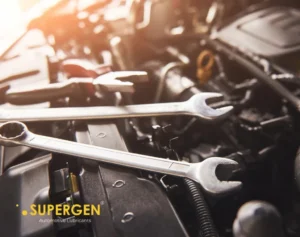Why is Oil Change Necessary?
In India, traditional oil change checks are generally limited to dip-stick checks. But that’s not all. The litmus paper on the dipstick only tells you the oil level. In other words, we cannot check the quality of the oil available, not the quantity. It should be understood here that the lubricating properties of motor oil are not permanent. With continuous operation over an extended period of time, the chemical composition of the oil breaks down accumulated dirt and other particles. In addition, the engine oil, which is the heart of the car, is a golden liquid that looks like real honey, so you can see the changes in the oil at a glance. On the other hand, after 5,000 miles (when checking or refilling the level gauge), it’s a thick, black, tar-like substance. This tarry material can cause sludge formation. It is recommended to change the oil before it turns completely black and begins to thicken.
Regular engine oil changes are essential for proper maintenance and performance of vehicles in India as they are in vehicles around the world. Here are some reasons why regular engine oil changes are important:
- Lubrication:
Engine oil plays an important role in lubricating engine components. Forms a thin film between moving parts to reduce friction and wear. Regular oil changes maintain the oil’s lubricating properties, prevent excessive friction, and extend the life of engine components.
- Heat Dissipation:
Engine oil serves to dissipate the heat generated by the engine. Oil absorbs and dissipates heat as it circulates through the engine. Over time, oil can become contaminated and lose its ability to dissipate heat. Regular oil changes ensure the availability of fresh, clean oil and help regulate the engine’s operating temperature.
- Removal of Contaminants:
Motor oil also acts as a cleaning agent, collecting and suspending harmful contaminants such as dirt, metal particles and combustion by-products. But over time, the oil becomes saturated with these contaminants, making it less effective. Regular oil changes remove old, dirty oil and replace it with clean oil. This prevents the build-up of contaminants that can lead to engine damage.
- Engine Power:
A fresh oil and additive package with the right viscosity will improve your engine’s performance. Maintains proper compression in the engine, reduces friction losses and ensures smooth operation. Regular oil changes help maintain engine performance, fuel economy, and overall performance.
- Engine Life:
Proper lubrication, proper heat dissipation and clean oil contribute to engine life. Regular oil changes reduce the risk of engine damage, wear and premature failure, keeping your engine in top shape for the long haul.
- Manufacturer’s Recommendation:
Car manufacturers provide specific guidelines for oil change intervals. Following these recommendations will ensure that your engine remains within manufacturer’s specifications, maximizing its performance and life. Keep in mind that the frequency of oil changes depends on a number of factors, including: B. Type of oil used, operating conditions, age of vehicle. Refer to your vehicle’s owner’s manual or seek advice from a qualified mechanic to determine the proper oil drain interval for your particular vehicle.
When Should the Engine Oil be Changed?
Car engines are different for each brand. In some cases, driving conditions also play a big role in deciding when to change your car’s engine oil. Considering the driving and road conditions in India. It’s fair to say that our driving conditions are quite different from the US and some European countries. Traffic jams, stop-and-goes, and potholes put a lot of strain on the engine.
Most motor oil experts recommend changing your car’s oil between 7,500 and 10,000 km, which is the right time. If mineral lubricants are used, the mileage should be kept within 5,000-5,500 km.
End Note:
In summary, regular engine oil changes are essential for Indian vehicles to maintain optimum performance, prevent engine damage and extend engine life. By ensuring proper lubrication, heat dissipation, and removal of contaminants, regular oil changes contribute to smoother operation, improved fuel efficiency, and reduced risk of premature engine failure. Following the manufacturer’s recommendations and expert advice will help determine the proper oil drain intervals for your individual vehicle, allowing owners to reap the benefits of a well-maintained engine.










